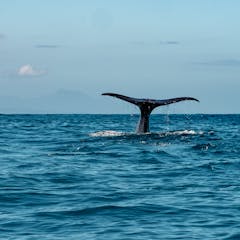
Articles sur Oceans
Affichage de 1 à 20 de 699 articles

Saturn’s moon Enceladus has geysers shooting tiny grains of ice into space. These grains could hold traces of life − but researchers need the right tools to tell.

A new treaty could help protect cetaceans in the Pacific, but more needs to be done internationally.

Maritime folklore is awash with tall tales of monstrous waves. A new study gets closer to understanding where they come from and how to predict them.

Blue carbon is stored in mangroves, seagrass and sediments. Discussions at the UN Ocean Decade conference reiterate the importance of preserving existing sea floor habitats, before it’s too late.

A coastal scientist explains why marshes, mangroves and other wetlands can’t keep up with the effects of climate change, and how human infrastructure is making it harder for them to survive.

An instrument on the Europa Clipper mission might be able to detect biological cells from space.

Global warming is making the oceans more acidic. Our work aims to design realistic systems to reduce this acidity, and remove carbon from the atmosphere in the process.

Egg cases of sharks and rays can be found washed up on the shore. Citizen science data helps scientists understand the life cycles of these marine animals and how to best conserve them.

Kelp seaweed spores are being grown on small rocks and waste scallop shells as part of a trial exploring how to regenerate the UK’s coastal kelp forests.

Hi-tech green LED lights attached to fishing gear can act as a deterrent to turtles and help reduce bycatch by approximately 40%.

We reviewed evidence on traditional knowledge in the Pacific for coping with climate change, and found much of it was scientifically plausible.

Artificial reef stars have been added to damaged coral reefs in Sulawesi, Indonesia. A new study shows that within just four years, restored reefs are thriving as much as healthy reefs.

Long lifespans and slow reproduction rates make deep-water sharks and rays as vulnerable to overexploitation as whales once were. We must place them under protection to avoid extinctions.

The toll on wildlife from illegal fishing, bycatch and entanglement in fishing gear is likely underestimated, because it doesn’t account for ‘dark’ fishing vessels, a new study finds.

As it travels around the ocean, plastic litter can harm wildlife and marine habitats in many ways. This study highlights five key hotspots where floating plastic poses the biggest risk.

It remains one of the biggest aviation mysteries – the tragic disappearance of passenger flight MH370. But a new, targeted search of the seabed could still yield answers.

Let’s delve into the three super-senses of dolphins: magnetic perception, electrical perception and echolocation.

Recent research sheds light on the ocean’s annual ‘biological clock’ and highlights the key dynamics that make it susceptible to climate change.

Deeper ocean habitats (30-150 metres) are a key feeding ground for critically endangered hawksbill turtles.

Recent research shows how reducing overfishing is both an ecological imperative and a critical means to addressing climate change.
